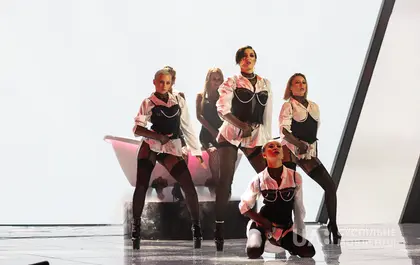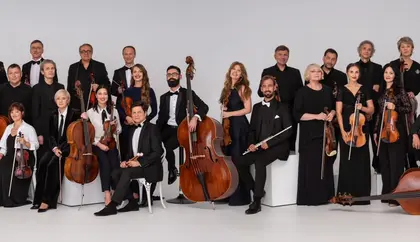Pop singer Maruv has won Ukraine’s nomination to represent the country in this year’s Eurovision Song Contest. There’s just one problem: her Russian concerts put her candidacy at risk.
With a provocative performance of “Siren Song,” Maruv claimed victory in Ukraine’s national selection for Eurovision on Feb. 23. The 27-year-old singer, whose real name is Anna Korsun, received five points from the jury and six points from the audience.
That allowed her to clinch the nomination, beating out five other finalists: performers Freedom Jazz, Kazka, Brunettes Shoot Blondes, Yuko, and Anna Maria.
Now, if the National Public Broadcasting Company of Ukraine signs off, Maruv will represent the country in Tel Aviv, Israel, where the 64th Eurovision Song Contest will take place on May 14–18.
Korsun is hardly new to Ukraine’s music industry. She is a well-known member of the band The Pringlez, which took third place in the Russian music contest New Wave in 2015.
But Korsun received true international recognition as Maruv, after the March 2018 premiere of her provocative “Drunk Groove” with DJ Boosin. The video hit received more than 88 million views.
Maruv’s performances are often colored with eroticism. In her videos, Korsun draws on her experience working in a strip club during her student years, according to public broadcaster Suspilne.
Maruv performs with the song Siren Song during Ukraine’s national final selection for Eurovision 2019 on Feb. 23.

Russia Aiming to Destroy Ukraine’s Cultural Identity
But that is hardly the most controversial thing about her in Ukraine.
During the final selection for Eurovision, the jury repeatedly asked finalists two questions that are important for Ukraine: to whom the Crimean peninsula belongs and why some of the participating artists regularly tour through Russia.
Russia illegally annexed Crimea and occupied parts of Ukraine’s eastern Donbas region in 2014, effectively launching a war against Kyiv. As the fighting continues, returning Crimea and the Donbas to government control are key goals of the Ukrainian authorities.
Maruv has repeatedly performed concerts in Russia. However, the artist sees no problem with this and says that she is trying to bring peace to Ukraine.
“Everyone chooses their own way to bring peace: some take up weapons, some take up music,” she told the jury. “Performing concerts is my way of bringing peace.”
She also isn’t poised to stop performing in Russia. The singer will give solo concerts in Moscow on April 6 and St. Petersburg on April 12.
Not everyone is happy with that.
“Ukraine’s representative (in Eurovision) cannot be an artist who tours through the aggressor state, plans to do so in the future, and sees nothing unacceptable about this,” deputy Prime Minister Vyacheslav Kyrylenko wrote on Twitter on Feb. 23. “Therefore, the story with the participant from Ukraine is far from complete,” he added.
The National Public Broadcasting Company of Ukraine, or NPBC, will make a decision on Maruv’s nomination in the next 48 hours, NPBC management board member Oleksandra Koltsova told the Hromadske television channel on Feb. 24.
“Now we should confirm or agree upon the victor, who will go (to Eurovision) from Ukraine,” she said. “And we as the public broadcaster will listen to society.”
“We would like to hear answers from Maruv, and of course we would like to start a discourse in Ukrainian society: can an artist who represents Ukraine at Eurovision go on concert tours to Russia,” Koltsova added.
However, later on Feb. 24, it appeared a decision had been reached. Maruv can sign a contract with the NPBC to represent Ukraine at Eurovision provided she cancels her concerts in Russia, the public broadcaster’s television channel UA:Pershy announced on Facebook. So far, there has been no response from the performer.
The annual Eurovision Song Contest, launched in 1956, is held in the country of the previous year’s winner. In 2018, Israel’s Netta Barzilai won the contest with her song “Toy” in Lisbon, Portugal.
Each year, up to 600 million viewers tune into Eurovision worldwide. Ukraine first entered the contest in 2003. Since then, two Ukrainian performers have won Eurovision — singers Ruslana in 2004 and Jamala in 2016.
You can also highlight the text and press Ctrl + Enter







